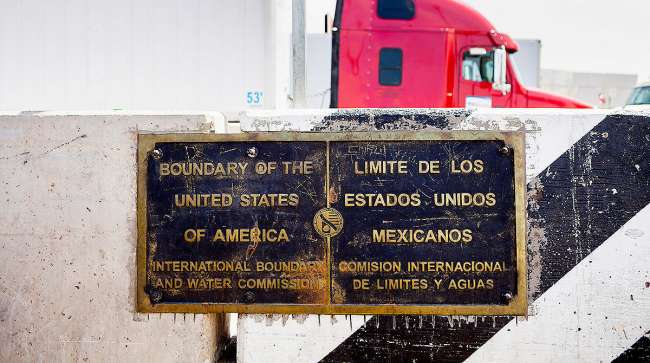Senior Reporter
Trucking Industry Prospers Amid NAFTA Uncertainty

An unsuccessful renegotiation of NAFTA would hurt the best for-hire freight environment in nearly 40 years, American Trucking Associations Chief Economist Bob Costello said. However, barring that “self-imposed risk,” this strong freight cycle could last an additional 18 months or more, he said.
Costello spoke April 3 during an industry conference call hosted by investment firm Stifel, Nicolaus & Co.
“This is the first time in this cycle of freight that all three of these [freight] drivers are accelerating and doing well,” he said, referring to consumer spending, manufacturing output and construction — especially single-family housing starts.

Costello
At the same time, more regional freight in support of e-commerce has led to more inventory, which is cycled through faster. “Inventories are not bloated,” he said.
Contract freight rates are at record levels, too, and GDP will increase to 3% in 2019 compared with 2.7% in 2018, he forecast.
“We have never seen anything like this in the post-deregulation environment,” Costello said.
The Motor Carrier Act of 1980, which President Jimmy Carter signed into law, deregulated the trucking industry.
Much of the current good news, however, could begin to wilt by early June if the North American Free Trade Agreement crumbles, he said.
The Trump administration is “getting antsy” and wants to announce something to show for its efforts to renegotiate NAFTA along lines President Donald Trump believes would be more fair to the United States.
But Mexico and Canada are “uncomfortable” with any signing because many details have yet to be finalized, he said.
After six rounds of negotiations, the United States, Canada and Mexico have made modest progress but remain deeply divided in five areas, including how to settle disputes and the amount of U.S. content in auto production, Bloomberg News reported.
If there is no deal by early June, Costello said, watch for the Trump administration to pull out of the negotiations, and six months after that the agreement would end if nothing changed.
Costello leads all of ATA’s trade and cross-border policy initiatives and has been to all but one of the rounds of NAFTA negotiations.
“NAFTA trade is hugely important to trucking,” as the industry moves the vast majority of goods crossing northern and southern U.S. borders and accounts for $6.6 billion in industry revenues, he said.
“If you took NAFTA away, and those jobs were gone, you could get rid of 31,000 truck drivers,” he added. Tariffs would go up, too. “All bad stuff.”
The next round of NAFTA talks is scheduled to begin April 8.
In related industry news, the Heavy Duty Manufacturers Association’s first-quarter 2018 Quarterly Supplier Barometer found suppliers’ hiring, production capacity and inventory levels are in record positive territory.
The outlook for all subsectors is positive, with on-highway OEM production leading the way, according to the Research Triangle Park, N.C.-based group. But suppliers also continue to face difficulties with forecast accuracy, demand volatility and — soaring to the top of the list of concerns — raw material prices.
“The sudden rise of material costs is likely of even greater concern as a result of proposed tariffs on steel and aluminum, and the far-reaching impact they will have on the supplier community. Comments on the [Trump administration-imposed tariffs on steel and aluminum from China, primarily] was the most mentioned issue of concern outside those on our list,” HDMA wrote in an e-mail.

Getty Images
Meanwhile, Bloomberg News reported spending on U.S. general purpose credit cards surged 9.4% last year, to $3.5 trillion, according to industry newsletter Nilson Report. Card delinquencies also are rising. U.S. household debt climbed in the fourth quarter at the fastest pace since 2007, according to the Federal Reserve.
Americans have a history of loading up on debt in good times, then paying dearly when the bills come due, according to Bloomberg. Adding to the pain: A booming economy is often accompanied by rising interest rates, which make mortgages, credit cards and other debt much more expensive.

